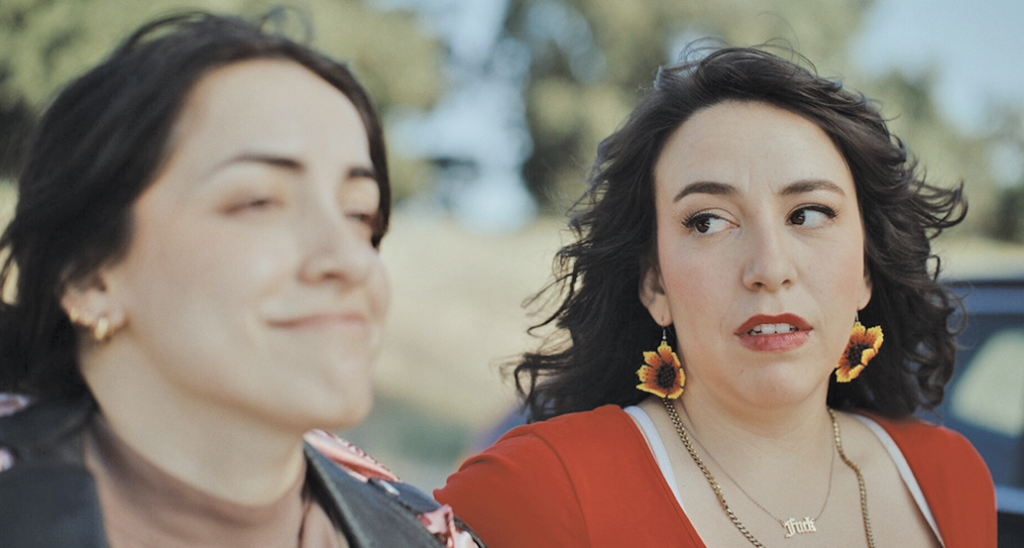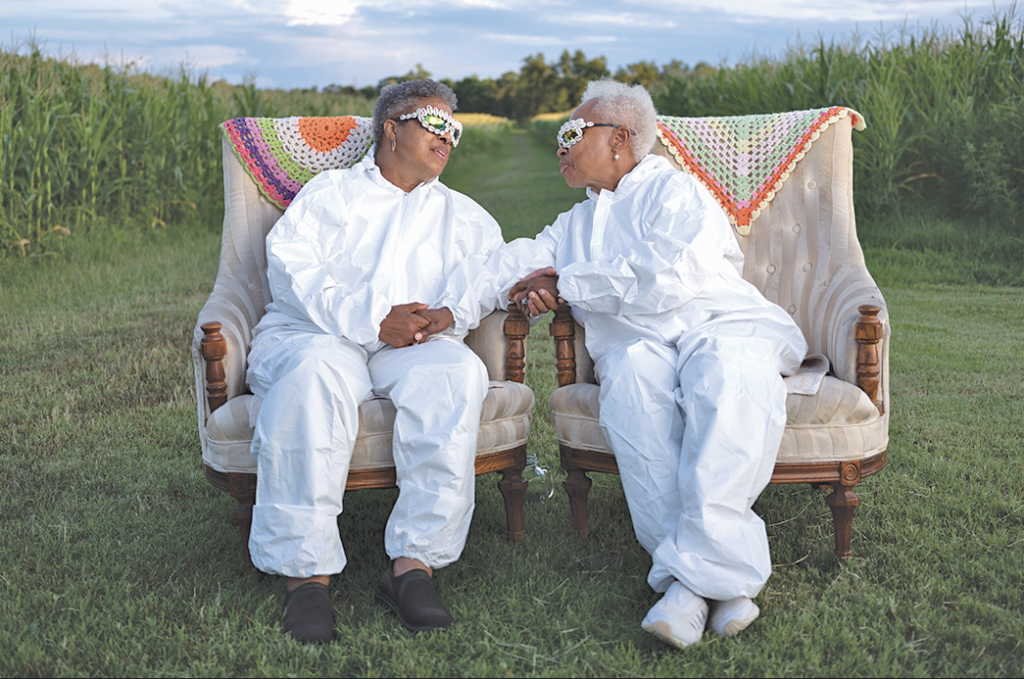
By T. Kebo Drew —
By the time I moved to San Francisco in the mid 1990s, I was burned out. I’d spent most of my youth in Oregon in social justice movement organizing, and fighting back against neo-Nazis and the right wing. I taught popular education workshops on fascism and I went on a Black lesbian poetry tour of small town and rural white Christian churches. I came here looking for ways to weave my art and activism into a stronger, flexible, brilliant fabric. Within my first few months in the city, I met filmmaker Madeleine “Mad” Lim. A few years later, she had founded the Queer Women of Color Media Arts Project (QWOCMAP), asking the question: “Who will tell our stories if we don’t?”
This year, QWOCMAP celebrates its twenty-fifth anniversary. Our annual International Queer Women of Color Film Festival runs June 13–15 at the Presidio Theatre, 99 Moraga Avenue.
Lately, I’ve been thinking about why I feel so fiercely about these films and why they feel so necessary. It all came together after reading something my old organizing buddy Scott Nakagawa wrote about how authoritarians manipulate history. He and I came up together as queers of color doing anti-fascist work in the Pacific Northwest. His piece about historical memory reminded me of something unsettling: I keep watching people discuss events that I’ve lived through, and the way those histories get twisted or disappear entirely.

The History They Want to Erase
One of the things that we discussed in my popular education workshops was how fascists burned Magnus Hirschfeld’s library in 1933—thousands of books and research on queer and trans lives, gone. Today feels familiar: removing the “T” from Stonewall, banning books, and defunding any organization that dares to name us as Black or transgender or immigrant in our work and grant applications.
Here’s what they can’t burn: our stories.
When Lim made The Worlds of Bernice Bing, she recovered a piece of our history that mainstream culture ignored—a pioneering Chinese American lesbian abstract expressionist artist in San Francisco whose work deserves more visibility. In her film Jewelle: A Just Vision, she has documented the wisdom of an artist, activist, and celebrated Black femme elder who participated in the second Pride march in 1971 and continues to fight today.

Films trace traditions that colonialism desperately tried to sever. QWOCMAP Freedom & Film Academy alums Julia Nacario’s The Painted Ones, and M. Kaleipumehana Cabral’s KA ʻĀʻUMEʻUME: Navigating Home—show how two-spirit, māhū, and other Indigenous gender traditions existed long before European colonization arrived with binary thinking, which is proof of what we’ve had and what we could have again.
And at this year’s film festival, we’re screening RENEGADES: Celestine Tate Harrington: Building a Legacy. Celestine was a disabled Black mother who fought for her right to be both an artist and a parent. In a world that tells disabled people, queer people, and Black people that we’re burdens, Celestine said: I am a creator; I am worthy; I make history.

What’s Happening Right Now
Decades ago, I learned that controlling language is one of the first things authoritarians do: deciding who can say what about their own lives; defining who and what is valued. We’re seeing it happen now.
This year, the City of San Francisco unconscionably rescinded grants to 38 organizations led by people of color, including QWOCMAP. We lost $500,000 in funding that would have supported queer and transgender people of color filmmakers telling the truth of LGBTQIA+ communities. Some in the city have advised us not to name the LBTQIA+ people of color community we serve, or couch what we do in “safer” language and euphemism to prevent legal challenges.
The message is clear: your histories don’t matter, your present can’t be named honestly, and your futures aren’t worth investing in.
But QWOCMAP refuses to stop. Our Saturday night Featured Screening of Standing Above the Clouds matters. It shows Kanaka Maoli (Native Hawaiian) mothers and daughters protecting the sacredness of Mauna Kea. Their story is about the right to exist, to practice ceremony, to pass traditions to the next generation. Our Sunday Featured Screening Can’t Stop Change: Queer Climate Stories from the Florida Frontlines is important. It demonstrates how queer and trans people of color and white LGBTQ+ folks show up for each other through mutual aid and collective care. Their story contrasts violent legislation with climate justice, disaster with hope and transformation.
These films show that what’s happening now connects to what has happened in the past. They also show us how to build the worlds we need for the future.

Hope as a Daily Practice
Last year, a filmmaker traveled from New York just to attend the screening of her film at our film festival. She told us it was the first time she’d seen people who looked like her living full, complex lives on screen. That recognition changed how she saw her own possibilities as a person and as an artist.
Our films expand the imagination of what’s possible. They document survival and thriving. They practice the futures we dream.
These are scary times. Arts funding is disappearing. Organizations are struggling to survive.
Yet, the twenty-five years of QWOCMAP has taught me that hope is a daily practice. Mariame Kaba calls it “the belief that we can change conditions that are harming us.” Our films are practices in that belief—exercises in imagining the worlds we need.
QWOCMAP began as a local light for Bay Area LBTQIA+ communities of color. We never expected to become what people call a global beacon. That’s what happens when you consistently make it possible for our communities to shout their truth, struggles, and joy: light travels much further than you planned.
QWOCFF2025 and Beyond
This June, QWOCMAP screens forty-nine films from around the world. We’re creating a space where our stories matter, where our communities are at the center, and where our futures are visible. We’re proving that, even in overwhelming times, we can create joy and connection and collective dreaming.

Our film festival is unique: it’s completely free, fully accessible, and open to everyone, with ASL interpretation, audio description, open captions, and COVID-conscious protocols. We believe our community deserves good things—including the chance to see ourselves as the complex, powerful people we’ve always been.
Queer and trans stories have survived book burnings and budget cuts, library raids, and legislative attacks. Our dreams will survive what’s coming. When we’re erased from the status quo version of history, we stitch fragments of the past into vibrant new stories. When someone attempts to silence us, we sing louder. When they try to steal our futures, we dream bigger, brighter, bolder.
Come dream with us. All of our lives depend on it.
The 21st annual International Queer Women of Color Film Festival runs June 13–15 at the Presidio Theatre, 99 Moraga Avenue, San Francisco. All events are free. For the full schedule and accessibility information, visit https://qwocff.org/
For more information about QWOCMAP, visit https://qwocmap.org/
T. Kebo Drew is the Managing Director of the Queer Women of Color Media Arts Project: https://qwocmap.org/
Arts & Entertainment
Published on June 12, 2025
Recent Comments